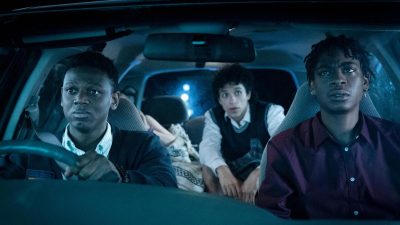

Directed by Carey Williams, Emergency, which evolved from a 2018 short film, originally premiered at Sundance Film Festival. The film stars RJ Kyler and Donald Elise Watkins as best friends Sean and Kunle. They are college seniors who plan to have one final blowout party night right before Spring Break. Their goal is to hit all seven of the big parties on campus, intending to make history, as nobody has ever done it. But their night doesn’t exactly get off to a promising start as Kunle, a science major who’s already gotten into Princeton for grad school, is worried about the live bacteria he didn’t properly refrigerate before he left the lab. But an even bigger concern emerges as they get back to their house and find a seventeen-year-old girl passed out on their living room floor. The only other one in the house is Carlos (Sebastian Chacon), their gamer roommate, who has no idea who she is or how she got there.
While Kunle’s first instincts are to call the police or at least an ambulance, Sean reminds him that, no matter their good intentions, they are still two black men and a Latino man standing over an unconscious white girl in their living room. Kunle is smart but naïve, and Sean is more well-versed in the ways of the world and convinces Kunle and Carlos that it would not be in their best interests to put themselves in the hands of the white authorities, especially under these circumstances. So, they concoct a plan to take care of her on their own, but, as would be expected, everything that can go wrong does, and their dream party night turns into a nightmare.
Many elements of Emergency are distilled from every other “blowout party night” movie ever made, from Booksmart to Superbad to Blockers, but what Dávila and Williams do is infuse those generic tropes with a social consciousness—or a social unconsciousness—which creates a weirdly topical and incisively meaningful cognitive and emotional experience that you hardly even notice because you’re laughing so hard. Issues of race and social justice in America seem like strange subjects for a college frat party movie, but Emergency walks a perfectly-toned fine line between silly and serious in the most unpretentious and unexpected ways. Nothing is predictable, even though we know how this will play out.
It’s easy to forget that film is an art form, and audiences react to art differently, depending on what they bring to it. A young white woman may respond to this film differently than a young black man might. However, the ubiquitous reminders of the racial divide in this country make for an understandable, if not relatable, film, no matter who you are. The final scene features the game of Jenga, a not-so-subtle metaphor for how precarious it must be to be black in America—and how one false move can tear everything down.
It may get a little ham-handed at times, but every bit of unevenness in Emergency is easily forgiven, thanks to a clever script and performances as endearing as they are effective. Every character is loaded with cliché, each one more a stereotype than the next, but Williams lets the actors play into those expectations instead of pushing against them. Kunle embraces his nerdiness, and Carlos’s social awkwardness is achingly sweet. These actors turn their character’s cliches into strengths, into endearing traits that make us fall in love with them. Shame often plays a significant role in films like this—the nerds are embarrassed to be nerds, the virgins are desperate to have sex, and the wallflowers feel they need to be wild and crazy to prove themselves. Still, Dávila writes proud and three-dimensional characters, people who are more than their cliché, and every one of these actors in the ensemble delivers pitch-perfectly.
But it is the overall tone of Emergency is its true calling card. Williams, along with cinematographer Michael Dallatorre, editor Lam T. Nguyen, and composer Rene G. Boscio, take the audience along a journey of emotions, blending moments of horror with moments of farce, mixing social commentary with introspection, and juxtaposing fears of police brutality with the lifesaving beat of the Bee Gees—making it look all too easy. The excellent craft, directing, and acting support a tremendously rich and textured (and hilarious) script by Dávila, who proves her Oscar nomination for her short film Please Hold last year was just the tip of the iceberg.
Emergency is not any one thing. Those expecting a mindless college party movie will be sorely disappointed. Anyone looking for a social commentary may be dismayed by the silliness. But those of us who are looking for an incredibly well-made film that defies expectation and delivers an experience that hits on every emotional and intellectual note while still managing to strike a truly soul-shaking social commentary will be happy to find Emergency, a film that works on every level.
Originally published at WeLiveEntertainment.
